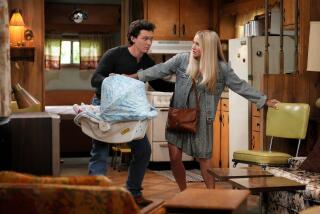Laughter, Anyone?
After marrying in Massachusetts, a gay emu rancher takes his Boston Brahmin husband home to live on the family spread in a red state. Hilarity ensues as the couple learn to recognize their moral depravity and find fulfillment with members of the opposite sex. It’s “Will & Grace” meets “Green Acres.”
Or, a team of attractive young battlefield interns in Iraq cracks jokes, drinks responsibly and avoids profanity in high-drama situations as American freedom fighters bring peace and democracy to the Middle East. It’s “MASH” meets “ER” meets “Scrubs.”
How about it, NBC? Can we produce a pilot?
TV analysts have been talking about the demise of the sitcom ever since the first survivor was booted off the island, but only with this fall season has it become clear that the form’s downturn is more than just a blip. This has been one of the worst seasons ever for sitcoms, and even shows that came with a built-in audience, like NBC’s “Friends” spinoff “Joey,” are flailing. The audience for “Joey” has dropped by a third, to about 12 million viewers, since its September premiere. Meanwhile, Variety reports that average viewership in the key 18-to-49 demographic for the season’s top five sitcoms is down 40% from that of their counterparts five years ago.
Executives bemoan the fact that no one has yet come up with a new concept that really clicks with the national mood, the way “All in the Family” did in the 1970s, “The Cosby Show” did in the 1980s and “Friends” and “Seinfeld” did in the 1990s. But then, the national mood isn’t all that conducive to creativity or humor; regulators are cracking down on what they judge to be inappropriate content on TV, the government uses the war on terror as an excuse to erode our freedoms, and legislators are seriously considering a constitutional amendment that would restrict Americans’ rights -- a same-sex marriage ban -- instead of expanding them.
Not a single successful 30-minute comedy was produced under the Taliban either.
It would be absurd to blame the failure of sitcoms solely on national politics. For one thing, it hasn’t stopped other TV forms. Reality shows still draw in audiences, as do such innovative hourlong dramas as “Lost” and “Desperate Housewives.”
But it’s hard to escape the feeling that these shows are successful mainly because they titillate during a time when such things are increasingly submerged, just as pornography was enormously popular in Victorian England.
Being funny is more difficult.
It’s no wonder Hollywood comedy writers are having a tough time tapping into the national psyche, given that their lifestyles and politics are so antithetical to American values as they’re currently defined.
If there is a national mood, it is one of fearfulness: fear of terrorists, fear of corrupting influences, fear of those who are different. The problem with fear is, it isn’t funny.
More to Read
The complete guide to home viewing
Get Screen Gab for everything about the TV shows and streaming movies everyone’s talking about.
You may occasionally receive promotional content from the Los Angeles Times.






